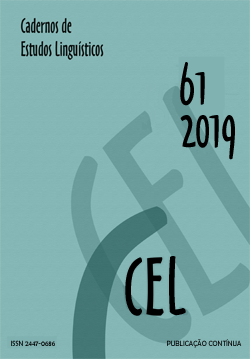Abstract
In this work, we analyze the ethos of a self-help book on finances directed specifically to the female audience, in order to reveal the image that the enunciator of the book projects of herself by its mode of enunciation. In addition, we analyze the images of women that this enunciator values and/or combat through their teachings, that is, we identify the stereotypes of women that this discourse collaborates to reinforce and/or transform. In order to operationalize the ethos research, we analyze the occurrences of the lexical expression of the modality, since modality is one of the forms of manifestation of subjectivity, more precisely a form through which the enunciator expresses his opinion or an attitude towards what says. Among the forms of lexical expression of the modality, we selected verbs (auxiliary and full), adjectives in predicative position and modal adverbs, and we rely on Functionalism as a specific theoretical-methodological apparatus of Linguistics as an auxiliary theory. The analysis reveals that an authoritarian tone prevails in the book, linked to the image of an assertive, convinced and focused enunciator in its goals, including guiding the reader in an assertive way. The analysis further reveals that the book reinforces the traditional gender stereotype according to which women are less prone to finances than men.
References
ALVES, J. E. D. Desafios da equidade de gênero no século XXI. Estudos Feministas, Florianópolis, v. 24, n. 2, p. 629-638, 2016.
BIROLI, F. Gênero e desigualdades: limites da democracia no Brasil. São Paulo: Boitempo, 2018.
BRUNELLI, A. F. O sucesso está em suas mãos: análise do discurso de autoajuda. 2004. 149f. Tese (Doutorado em Linguística) – Instituto de Estudos da Linguagem, Universidade Estadual de Campinas, Campinas.
BRUNELLI, A. F.; GASPARINI-BASTOS, S. D. Os valores do verbo modal poder em português: da língua ao discurso. In: XV Congreso Internacional de ALFAL, 2008, Montevideo-Uruguai. Actas. Montevideo-Uruguai: ALFAL, 2008.
BRUNELLI, A. F.; GASPARINI-BASTOS, S. D. O comportamento do verbo modal poder no discurso de autoajuda: uma investigação no português e no espanhol. Estudos Linguísticos, v. 40, n. 1, p. 61-70, 2011.
BRUSCHINI, C. O trabalho da mulher brasileira nas décadas recentes. Estudos Feministas, Rio de janeiro, ano 2, p. 179-199, 1994.
CASIMIRO, S. Um estudo das modalidades deôntica e volitiva nos discursos do presidente Lula. 2007. 108f. Dissertação (Mestrado em Estudos Linguísticos) – Instituto de Biociências, Letras e Ciências Exatas, Universidade Estadual Paulista, São José do Rio Preto.
DAMIANI, D.; ALMEIDA, C. Ganhar, gastar, investir: o livro do dinheiro para mulheres. Rio de Janeiro: Sextante, 2016.
FISKE, S. T.; CUDDY, A. J. C.; GLICK, P. Universal dimensions of social perception: warmth and competence. Trends in Cognitive Science, v. 11, n. 2, p. 77-83, 2007.
FRANKEL, L. P. Mulheres ousadas chegam mais longe. São Paulo: Editora Gente, 2005.
FRANKEL, L. P. Mulheres boazinhas não enriquecem. São Paulo: Editora Gente, 2006.
FURLAN, M. M. Cenas de enunciação e ethos discursivo: análise do discurso de autoajuda para adolescentes. 2013. 108f. Dissertação (Mestrado em Estudos Linguísticos) – Instituto de Biociências, Letras e Ciências Exatas, Universidade Estadual Paulista, São José do Rio Preto.
GASPARINI-BASTOS, S. D. Os constituintes extrafrasais com valor epistêmico: análise de entrevistas jornalísticas do espanhol e do português. 2004. 161f. Tese (Doutorado em Linguística e Língua Portuguesa) – Faculdade de Ciências e Letras, Universidade Estadual Paulista, Araraquara.
HENGEVELD, K. Illocution, mood, and modality. In: BOOIJ, G.; LEHMANN, C.; MUGDAN, J. (eds.) Morphology: a handbook on inflection and word formation. v. 2. Berlin: Mouton de Gruyter, 2004. p. 1190-1201.
HENGEVELD, K. The grammaticalization of tense and aspect. In: HEINE, B.; NARROG, H. (eds.). The Oxford handbook of grammaticalization. Oxford: Oxford University Press, 2011. p. 580-594.
HENGEVELD, K.; HATTNHER, M. M D. A. Four types of evidentiality in the native languages of Brazil. Linguistics, v. 53, n. 3, p. 479-524, 2015.
MAINGUENEAU, D. Ethos, cenografia, incorporação. In: AMOSSY, R. (org.). Imagens de si no discurso: a construção do ethos. São Paulo: Contexto, 2005. p. 69-92.
MAINGUENEAU, D. A propósito do ethos. In: MOTTA, A. R.; SALGADO, L. (orgs.). Ethos discursivo. São Paulo: Contexto, 2008. p. 11-29.
MAINGUENEAU, D. Doze conceitos em análise do discurso. POSSENTI, S.; SOUZA E SILVA, M. C. P. (orgs.). São Paulo: Parábola, 2010.
NEVES, M. H. M. A modalidade. In: KOCH, I. G. V. (org.). Gramática do português falado 6: Desenvolvimentos. Campinas: Editora da UNICAMP/FAPESP, 1996. p. 163-195.
NEVES, M. H. M. Imprimir marcas no enunciado. Ou: a modalização na linguagem. In: NEVES, M. H. M. Texto e gramática. São Paulo: Contexto, 2006. p. 152-221.
OLBERTZ, H.; GASPARINI-BASTOS, S. D. Objective and subjective deontic modal necessity in FDG – evidence from Spanish auxiliary expressions. In: MACKENZIE, J. L.; OLBERTZ, H. (eds.) Casebook in Functional Grammar. Amsterdam: John Benjamins, 2013. p. 277-300.
ORMAN, S. As mulheres e o dinheiro. Rio de Janeiro: Nova Fronteira, 2007.
UEDA, M. B. O ethos das obras de autoajuda para a terceira idade. 2014. 104f. Dissertação (Mestrado em Estudos Linguísticos) – Instituto de Biociências, Letras e Ciências Exatas, Universidade Estadual Paulista, São José do Rio Preto.

This work is licensed under a Creative Commons Attribution-NonCommercial 4.0 International License.
Copyright (c) 2019 Cadernos de Estudos Linguísticos


